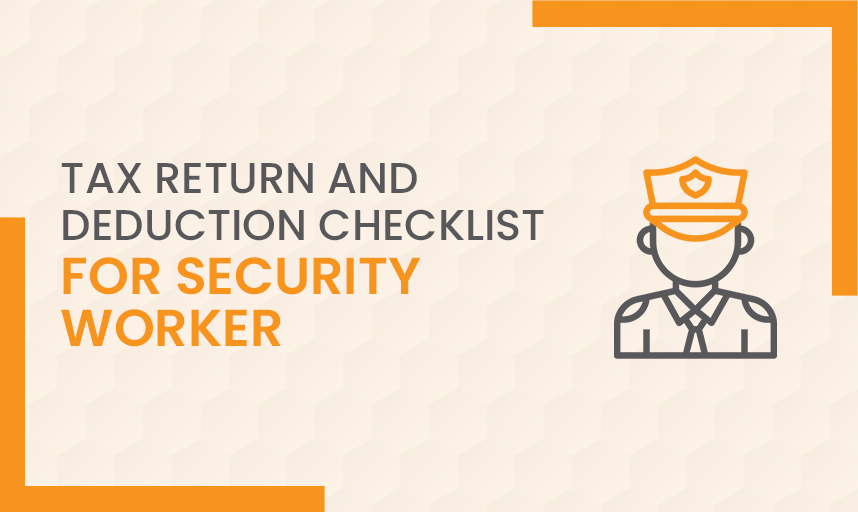Tax Return and Deduction Checklist For Security Worker

Being a security worker is a demanding job. You’re on the front lines, keeping people and property safe. But let’s face it, safety isn’t the only thing you need to worry about. Financial security is important too, and making sure you get the most out of tax time can give you a nice little financial boost.
The problem? Tax deductions can be tricky. It’s easy to miss out on things you’re entitled to claim, simply because you didn’t know they were options. That’s where this blog comes in.
We at KPG Taxation are here to break down everything you need to know about claiming deductions as a security worker. So let’s begin!
The Basics of Tax Deductions For Security Workers
Before we dive into specifics, let’s establish the ground rules. In Australia, you can claim deductions for work-related expenses you incur throughout the financial year. Here’s the key thing to remember:
- The expense must be directly related to earning your income as a security worker.
- You must have spent the money yourself and not been reimbursed by your employer.
- You need to keep records of the expenses, like receipts or invoices.
Tax Deductible Expenses for Security Guards
To maximise your tax return, it’s crucial to identify deductible expenses related to your job. Remember, an expense qualifies for deduction if:
- You incurred the expense and weren’t reimbursed.
- The expense is job-related.
- You have documentation to substantiate the claim.
Here’s a breakdown of deductible expenses for security guards:
| Expenses | Examples |
| Security Uniforms and Clothing | Purchase, laundry, and maintenance |
| Protective Equipment | Masks, helmets, sunscreen |
| Tools and Equipment | Flashlights, radios, self-protection |
| Self-Education and Training | Courses, seminars, certifications |
| Licences and Certifications | Renewal fees |
| Work Union Fees | Membership dues |
| Travel Expenses | Work-related travel, conferences |
| Car Expenses | Work-related car use |
| Phone and Computing Costs | Work-related communication |
| Home Office Expenses | Work-related utilities, rent |
What Can Security Workers Claim? Let's Get Specific!
Now for the good stuff! Here’s a breakdown of common deductions you, as a security worker, can claim on your tax return:
Uniforms Upkeep
Those crisp security uniforms aren’t cheap, and keeping them clean adds to the cost. The good news is that you can claim the cost of buying, repairing, and laundering uniforms that have your company logo or name on them.
Protective Gear
Security work often requires specific gear. This could include torches, radios, self-defence equipment, keychains, and even sunscreen (especially if you work outdoors). The cost of buying and maintaining these tools (up to $300) is claimable. For items exceeding $300, you can claim depreciation over time.
Training
Investing in your professional development is always a smart move. So, if you take courses or seminars related to security work, like self-defence training or first-aid certification (especially if you’re a designated first-aider), you can claim those expenses too.
Licence to Work
Security licences and certifications are essential for your job. While you can’t claim the initial cost of getting your licence, you can claim the renewal fees.
Work-Related Travel
If you’re a security guard who works at two different locations across the city then this is for you! The cost of driving between those jobs using your own car can be claimed using the cents per kilometre method.
Phone
If you use your personal phone for work calls and texts, and you aren’t reimbursed by your employer, you can claim a portion of the cost (keep records for claims over $50).
Union & Industry Fees
Fees associated with memberships that benefit your work as a security guard can be claimed as deductions.
Self-Education
Investing in your professional development through relevant courses or seminars can enhance your skills and improve your career prospects. These expenses are claimable.
Other Expenses
There are a few other work-related expenses you might incur, such as interest on loans taken out for work purposes or overtime meal allowances (if not reimbursed by your employer). These can also be claimed as deductions.
Remember, It's All About Keeping Records!
The key to claiming these deductions successfully is having proper documentation. Receipts, invoices, bank statements, membership cards, and even online purchase confirmations (emails) can all serve as proof of your work-related expenses.
For expenses under $10 (totalling less than $200 annually), you can make a note in your diary with the details mentioned in the table.
Don't Hesitate to Seek Help
This blog provides a general overview, and it’s always best to consult with a registered tax agent for personalised advice. And for this, you can rely on KPG Taxation. They have expert tax experts who can ensure you’re claiming everything you’re entitled to and help you handle the complexities of the tax system.
- Categories
- Tax Return

Focus On Growing Your Business, Leave The Accounting On Us!
- Income Tax : File your taxes & get the best claims & returns.
- Accountancy : Hire expert accountants to manage your transactions.
- Bookkeeping : Let us handle your record books and expense reports.
- Business Advisory : From company set-up to payroll, we handle it all.



